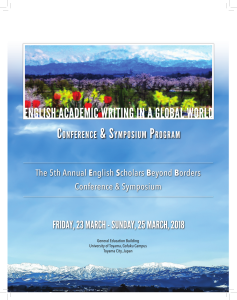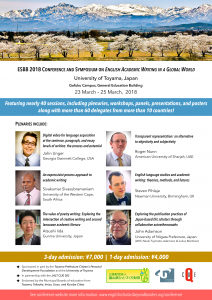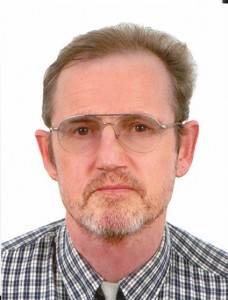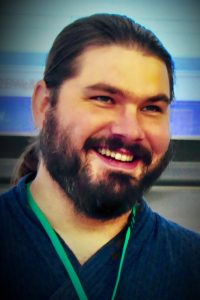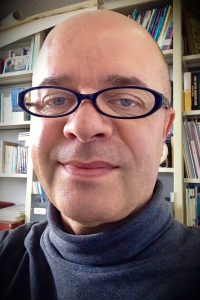This is the page for the one-day ESBB 2018 Symposium on English Academic Writing in a Global World. Please see the full conference site for information on the full 3-day conference and symposium.
This symposium has been made possible through the generous financial support of the Toyama Prefecture Citizen’s Personal Development Foundation (TPCPDF) | (公財) 富山県ひとづくり財団 and the University of Toyama.
The program book for the ESBB 2018 Conference and Symposium is available below. Please note that this is a late draft and is still subject to change.
Our event flier is available below:
Symposium Program, Friday 23 March, 2017
| 9:00 | Registration opens
Please pre-register here to take advantage of the early bird discount (Cost: 3,000 JPY for the one-day symposium only, 5,000 JPY for all 3 days of the symposium and conference) Participants are also welcome to register on the day (Cost: 5,000 JPY for the one-day symposium) |
| 10:00 – 10:30 | Opening remarks
From the University of Toyama President’s Office: TBA
|
| 10:30 – 11:30 | Symposium Plenary 1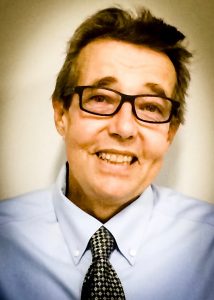
|
| 11:30 – 1:00 | Lunch & Social Time |
| 1:00 – 2:30 | Symposium Plenary Workshop (Plenary 2)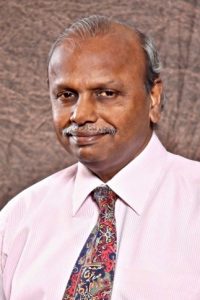
An Expressivist–Process Approach to Academic Writing Sivakumar Sivasubramaniam (Language Education Department, University of the Western Cape, South Africa) |
| 2:30 – 2:45 | Break |
| 2:45 – 3:45 | Symposium Plenary 3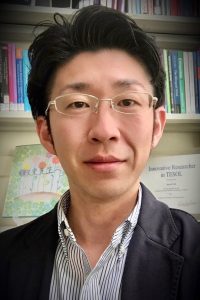
Atsushi Iida (University Education Center, Gunma University, Japan) |
| 3:45 – 4:00 | Break |
| 4:00 – 5:00 | Discussion panel on English Academic Writing in a Global World
Panelists: John Unger (Georgia Gwinnett College, USA) Moderator: Theron Muller (University of Toyama, Japan) |
| 5:30 – 7:30 | Conference reception at Azami Cafe, University of Toyama Gofuku Campus |
Symposium Presenters and Abstracts
Symposium Plenary 1
Digital Video for Language Acquisition at the Sentence, Paragraph, and Essay Levels of Writing: The Process and Potential
John Unger (Georgia Gwinnett College, USA)
Abstract
In this digital age where information is generally compressed into easy to understand, clickable chunks of text, often accompanied by photos, icons of one type or another, or emojis, students from across the world are experiencing less and less practice with in-depth writing and reading as a part of their daily lives, specifically with English. The digital video activities presented in this symposium plenary are intended to provide students with the opportunity to practice a deeper-level and different type of interaction and way of thinking about writing and the creation of meaning. The audience will be provided with specific examples, flexible strategies, and a theoretical basis for using digital video for vocabulary, sentence-level structure, paragraph summary and response writing, and essay writing. The Power Point presentation, downloadable sentence completion exercises, assessment documents, and directions for all activities, which can be adapted for different objectives and varying English language competencies, along with exemplar cases, will be available online at Transitional-Literacy.Org on a webage labeled ESBB18 Toyama University. The data and teaching materials are part of an ongoing project to bring the ideas from Michael Tomasello’s Usage Based Theory of Language Acquisition, along with older Vygotskian related theories, and a broad spectrum of concepts from Semiotics and Second Language Acquisition, into practical use for secondary and postsecondary ESL/EFL learners. These methods have also been used in developmental math courses and with courses for those with English as a first language.
Bio
John Unger is currently an Associate Professor of English for Academic Purposes (EAP) at Georgia Gwinnet College, in Lawrenceville, Georgia, near Atlanta in the southeastern part of the U.S. He has worked and studied in a wide variety of ESL/EFL and developmental English contexts for well over twenty years. He has presented papers and workshops, and taught undergraduate and graduate courses with Teaching English to Speakers of Other Languages (TESOL) as a core responsibility and theme, along with related teaching and intensive action-based research projects revolving around the topics of gesture and language, writing, developmental English, linguistics, traditional English grammar and usage, literacy, semiotics and video games, and multilingual/ multicultural education. He has published a relatively small number of articles and book chapters and worked for several years as an Associate Editor for the Asian EFL Journal. His editing philosophy was to take authors’ research and papers and shape them into useful, practical resources for researchers and teachers. He is trying to extend this theme to the editing and reviewing work he does for English Scholars Beyond Borders, and to his own writing.
Symposium Plenary Workshop (Plenary 2)
An Expressivist –Process Approach to Academic Writing
Sivakumar Sivasubramaniam (Language Education Department, University of the Western Cape, South Africa)
Abstract
The current culture of calculable thinking rampant in many higher education settings, not only in South Africa, but also in many parts of the globe, appears to view closure-focused students as idealized human beings. This is because researchers, as well as teachers, in the rationalist/positivist tradition, believe that language learning is a closure-focused task aimed at producing determinate/fixed meanings/outcomes, which are not only atemporal and universal, but are also measurable and quantifiable and, therefore, justifiable. Such a stance/position not only projects an asocial view of language learning but also diminishes its power and promise for promoting voice and agency in our teachers and students alike. It is only when we promote our teachers’ and students’ voices that can we foster social and educational empowerment. In light of this, the prevalence of folktales in our language settings can foster an array of beliefs, intuitions and value-systems with which we can effect a shift of focus from language as a linguistic code to language as a phenomenon in which learners cross the border of their first language into a second in order to reconstruct their selves and world. To this end, we can use folktales/imaginative content and their attendant expressivist-process approach in the educational practices of academic writing.
Folktales have many unique characteristics: they are good stories, and powerful social, cultural and moral expressions. Because of the abundant presence of simple language and context-facilitating illustrations, folktales are easily accessible to students with limited language abilities. However, this is not to suggest that folktales are suited only for students with limited language abilities. There are many demanding and challenging literary retellings of folktales, which can engage advanced language learners in the creative and hypothetical use of language, which can benefit the practices of academic writing. Thus, folktales can be an excellent language teaching resource/tool. Based on this premise, this workshop will inform and signpost theoretical issues relevant to the expressivist-process approach, and discuss a set of classroom procedures for operationalizing the use of folktales/imaginative content in language classroom settings.
Bio
Dr. Sivakumar Sivasubramaniam is Professor and Head of Language Education in the Faculty of Education at the University of the Western Cape, Republic of South Africa (RSA). He is also a National Research Foundation (NRF) rated Researcher in RSA. Dr. Sivakumar Sivasubramaniam serves on the Editorial Board of the Journal of English as an International Language (EILJ) as Chief Editor and the Editorial Board of Asian EFL Journal (AEJ) as Associate Editor. In addition, he serves as Honorary International Adviser to TESOL International Journal and as Executive Board Member of the International TESOL Accrediting Authority (ITAA). He has been a foreign language/ second language educator for over thirty years and has taught English in India, Ethiopia, Thailand, Bahrain, Armenia, and U.A.E prior to relocating to the Western Cape, South Africa. His research interests include response-centred reading/ writing pedagogies, literature-based language pedagogies, constructivism in EIL, second language advocacy, narratives in language education and text-based approaches to academic and social literacy practices.
Email contact: ssivasubramaniam@uwc.ac.za and sivakumar49@yahoo.com
Symposium Plenary 3
The value of poetry writing: Exploring the intersection of creative writing and second language academic literacy
Atsushi Iida (University Education Center, Gunma University, Japan)
Abstract
Many researchers have shown that studying and composing poetry helps second language (L2) learners to develop their voice, express important social ideas, and enhance L2 literacy development (Chamcharatsri, 2013; Hanauer, 2010, 2012; Iida, 2010, 2012; Spiro, 2014). Hanauer (2011) points out that literacy development can be direct or indirect and that some aspects of poetry writing may be transferrable to other forms of literacy. However, we know relatively little about the ways in which learning one genre influences the ability to function in another. This plenary talk addresses this issue by exploring the value to the development of academic literacy of composing haiku – a three line Japanese poem with a specific number of syllables in each line – in an L2.
In this presentation, I will problematize traditional L2 pedagogy, describe a theoretical framework of poetry writing as a form of meaningful literacy (Hanauer, 2012), and explore the value of poetry writing as a way of L2 learning. To do this, I will provide empirical evidence from my research into haiku poetry and Japanese EFL writers, focusing on the following three viewpoints: textual features of English-language haiku; cross-genre literacy development in an L2; and students’ perceptions and attitudes concerning English-language haiku writing. Overall, the presentation highlights the significance of poetry writing as a method for developing L2 literacy and provides some pedagogical implications for the teaching of poetry writing in the L2 context.
Bio
Atsushi Iida is Associate Professor of English in the University Education Center at Gunma University, Japan. He was awarded his Ph.D. in English (Composition and TESOL) at Indiana University of Pennsylvania. His research interests include second language writing, poetry writing, literature in second language education, and writing for academic publication. He has published his work in various journals including Assessing Writing, System, Scientific Study of Literature, English Teaching Forum, and Asian EFL Journal.
Discussion panel on English Academic Writing in a Global World
Panelists:
John Unger (Georgia Gwinnett College, USA)
Sivakumar Sivasubramaniam (Language Education Department, University of the Western Cape, South Africa)
Atsushi Iida (University Education Center, Gunma University, Japan)
Roger Nunn (Department of Writing Studies, American University of Sharjah, UAE)
John Adamson (University of Niigata Prefecture, Japan)
The panel will be fielding questions and comments from one another and from the audience on the day of the symposium. If you would like to submit your questions in advance, please send them to the Moderator, Theron Muller, at theron@las.u-toyama.ac.jp.

